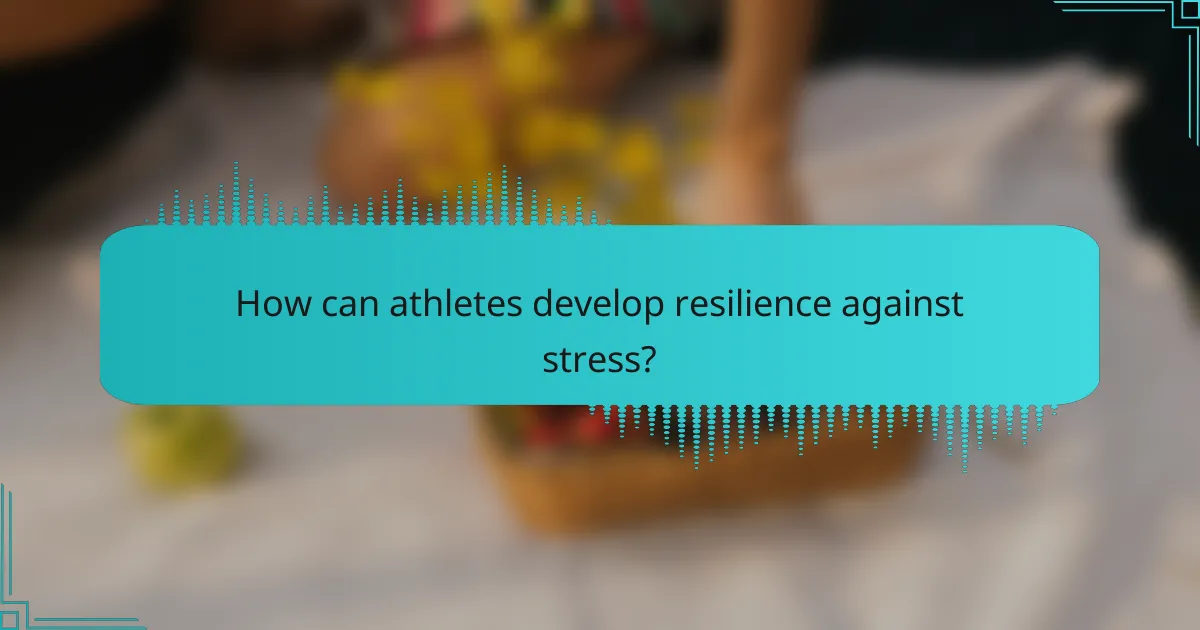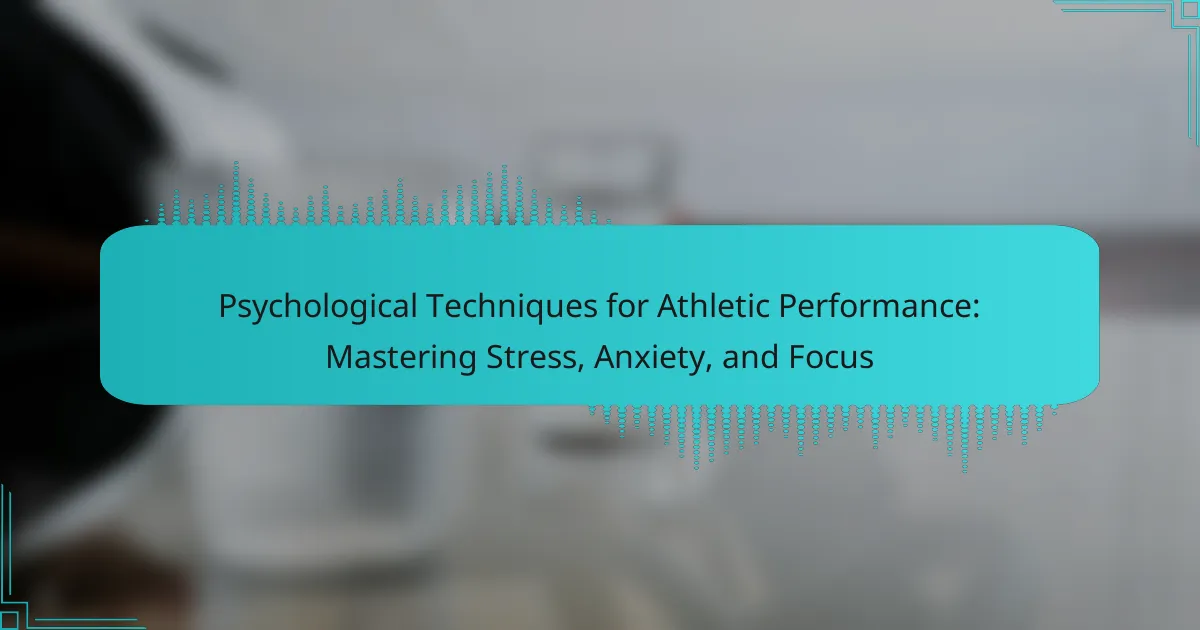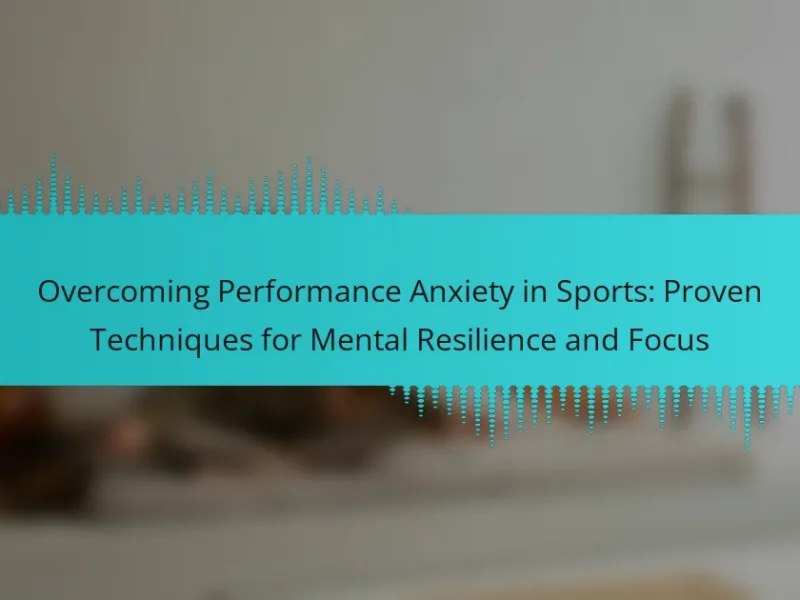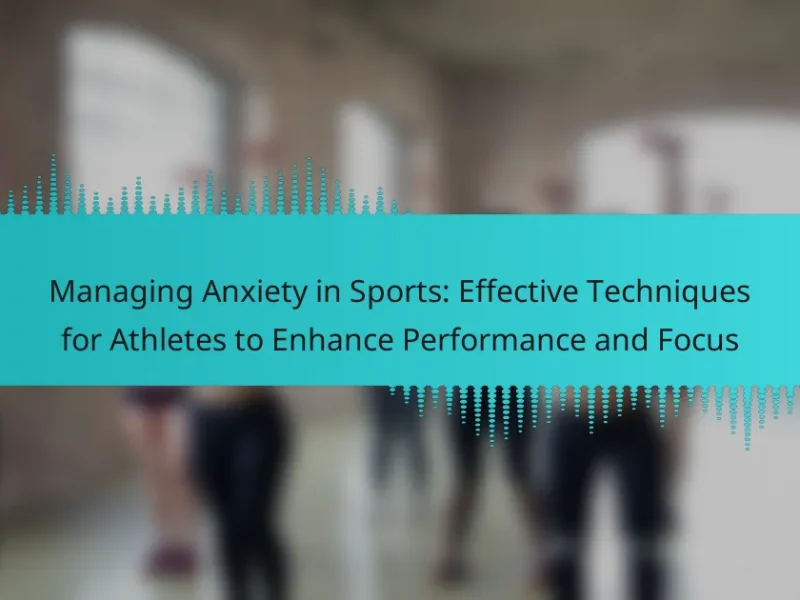Psychological techniques can significantly enhance athletic performance by improving focus and managing stress. Key methods include visualization for mental rehearsal, mindfulness for stress reduction, and goal-setting for motivation. These strategies help athletes develop resilience against anxiety and optimize their mental state during competitions. Regular practice of these techniques leads to better outcomes and coping mechanisms under pressure.

How do psychological techniques enhance athletic performance?
Psychological techniques significantly enhance athletic performance by improving focus, managing stress, and reducing anxiety. Techniques such as visualization, self-talk, and mindfulness training help athletes optimize their mental state, leading to better outcomes in competition. For example, visualization allows athletes to mentally rehearse their performance, which can enhance muscle memory and confidence. Research shows that athletes who engage in regular mental training report lower anxiety levels and improved focus during competitions. As a result, these psychological strategies contribute to overall performance enhancement and better coping mechanisms under pressure.
What are the common stressors faced by athletes?
Athletes commonly face stressors such as performance pressure, injury concerns, and competition anxiety. These stressors can significantly impact their focus and overall performance. Performance pressure arises from expectations set by coaches, peers, and themselves. Injury concerns create fear of setbacks and uncertainty about recovery. Competition anxiety leads to nervousness before events, affecting mental clarity. Understanding these stressors is crucial for implementing effective psychological techniques to enhance athletic performance.
How does anxiety impact athletic performance?
Anxiety negatively impacts athletic performance by impairing focus and increasing stress. Athletes may experience decreased coordination, slower reaction times, and reduced endurance due to anxiety. Research indicates that high anxiety levels correlate with poorer performance outcomes. Techniques such as visualization and mindfulness can mitigate these effects, enhancing mental resilience and focus during competition.
What are the physiological responses to anxiety in athletes?
Anxiety triggers several physiological responses in athletes, impacting performance. Common responses include increased heart rate, elevated blood pressure, and heightened muscle tension. These reactions can lead to decreased coordination and slower reaction times. Understanding these effects helps athletes manage anxiety through psychological techniques.
What psychological techniques are widely used to cope with stress?
Cognitive-behavioral techniques, mindfulness, and visualization are widely used psychological techniques to cope with stress. These methods help athletes manage anxiety, enhance focus, and improve overall performance. Cognitive-behavioral techniques focus on changing negative thought patterns, while mindfulness promotes present-moment awareness, reducing stress. Visualization involves mentally rehearsing successful performance, which can boost confidence and reduce anxiety. Each technique can be tailored to individual needs, making them effective tools for athletic performance.
How can visualization improve performance under pressure?
Visualization enhances performance under pressure by allowing athletes to mentally rehearse successful outcomes. This technique reduces anxiety and builds confidence. Research shows that mental imagery activates similar brain regions as actual performance, improving focus and reaction times. Athletes using visualization report increased control over stress responses, leading to better execution during competitions.
What role does positive self-talk play in managing anxiety?
Positive self-talk significantly reduces anxiety by fostering a constructive mindset. It encourages athletes to focus on their strengths and capabilities, enhancing confidence and performance. Research indicates that positive affirmations can lower stress levels and improve emotional regulation. By consciously replacing negative thoughts with positive ones, athletes can create a resilient mental environment, crucial for peak performance in high-pressure situations.
What unique strategies can athletes adopt for stress management?
Athletes can adopt unique strategies such as mindfulness, visualization, and controlled breathing for effective stress management. Mindfulness enhances focus by promoting present-moment awareness, reducing anxiety. Visualization allows athletes to mentally rehearse performance, boosting confidence. Controlled breathing techniques help regulate physiological responses to stress, fostering calmness. Each strategy contributes uniquely to improved psychological resilience and performance.
How can mindfulness practices be tailored for athletes?
Mindfulness practices can be tailored for athletes by incorporating techniques that enhance focus, reduce anxiety, and manage stress. Specific strategies include visualization, breath control, and body scanning.
Visualization helps athletes mentally rehearse performances, improving confidence and reducing pre-competition anxiety. Breath control techniques, such as diaphragmatic breathing, can calm the nervous system and enhance focus during high-pressure situations. Body scanning promotes awareness of physical sensations, allowing athletes to identify tension and relax effectively.
Integrating these practices into training routines fosters mental resilience, leading to improved athletic performance. Regular mindfulness sessions can enhance overall well-being, contributing to sustained success in competitive environments.
What are the benefits of cognitive restructuring for athletes?
Cognitive restructuring offers athletes several benefits, enhancing their mental resilience and performance. It helps reduce anxiety by reframing negative thoughts, fostering a positive mindset. Improved focus results from identifying and altering unproductive thought patterns. Additionally, athletes experience increased confidence and motivation, leading to better training outcomes. Enhanced emotional regulation allows for more effective stress management during competitions. Overall, cognitive restructuring equips athletes with tools to optimize their psychological performance.
What rare techniques are emerging in sports psychology?
Emerging rare techniques in sports psychology include mindfulness-based interventions and biofeedback training. These methods enhance athletes’ ability to manage stress, anxiety, and maintain focus during competition. Mindfulness practices help athletes cultivate present-moment awareness, while biofeedback provides real-time physiological data, allowing for better emotional regulation. These innovative approaches are gaining traction for their effectiveness in improving athletic performance.
How can biofeedback be used to manage anxiety?
Biofeedback can effectively manage anxiety by teaching individuals to control physiological functions. This technique helps athletes recognize their body’s stress responses and develop coping strategies. By using sensors that provide real-time feedback on heart rate, muscle tension, and brain waves, individuals can learn to regulate these responses, leading to reduced anxiety levels. Studies show that biofeedback can significantly lower anxiety symptoms, enhancing overall performance and focus.
What innovative practices are being explored in elite sports?
Psychological techniques are increasingly innovating elite sports by enhancing athletes’ performance through stress management, anxiety reduction, and improved focus. Techniques such as mindfulness training help athletes maintain concentration under pressure, while cognitive-behavioral strategies address anxiety and build resilience. Visualization practices allow athletes to mentally rehearse performances, fostering confidence and reducing performance-related stress. Neurofeedback is emerging as a unique method, enabling athletes to train their brain activity for optimal performance. These practices collectively contribute to a holistic approach in sports psychology, promoting mental well-being and peak performance.

How can athletes develop resilience against stress?
Athletes can develop resilience against stress by employing psychological techniques such as visualization, mindfulness, and goal-setting. These methods enhance focus and reduce anxiety, leading to improved performance. Visualization allows athletes to mentally rehearse success, while mindfulness practices help manage stress levels. Goal-setting provides clear objectives, fostering motivation and a sense of control. Regular practice of these techniques cultivates a resilient mindset, essential for overcoming challenges in competitive sports.
What are the key components of mental toughness?
Mental toughness comprises resilience, focus, confidence, and emotional control. These components enable athletes to manage stress and maintain performance under pressure. Resilience allows recovery from setbacks, while focus ensures concentration on goals. Confidence fosters belief in abilities, and emotional control helps regulate responses to challenges. Each component interconnects, enhancing overall athletic performance.
How does goal-setting influence stress management?
Goal-setting significantly reduces stress by providing clear objectives and a sense of control. When athletes set specific, measurable goals, they can focus their efforts and manage their anxiety more effectively. Research shows that goal-setting enhances motivation and commitment, leading to improved performance and reduced stress levels. By breaking larger goals into smaller, achievable tasks, athletes can experience a sense of accomplishment, further mitigating stress.
What are SMART goals and how can they help athletes?
SMART goals help athletes by providing a structured approach to setting objectives that enhance performance. SMART stands for Specific, Measurable, Achievable, Relevant, and Time-bound. This framework allows athletes to clarify their targets, track progress, and stay motivated. By defining clear goals, athletes can reduce anxiety and improve focus, leading to better outcomes in training and competition. Implementing SMART goals fosters a sense of accomplishment and encourages consistent effort.
What practical tips can athletes implement for immediate stress relief?
Athletes can implement several psychological techniques for immediate stress relief. Deep breathing exercises help calm the mind and reduce anxiety. Visualization techniques allow athletes to mentally rehearse their performance, enhancing focus and confidence. Progressive muscle relaxation aids in releasing tension throughout the body. Mindfulness meditation fosters present-moment awareness, minimizing distractions. Positive self-talk can counter negative thoughts, boosting morale. Engaging in brief physical activity, like stretching or a short walk, can also alleviate stress and improve mood.
How can breathing techniques be effectively used during competition?
Breathing techniques can enhance focus and reduce anxiety during competition. Athletes can use deep diaphragmatic breathing to lower heart rates and promote calmness. This technique helps manage stress by increasing oxygen flow, which improves mental clarity. Practicing rhythmic breathing before and during events can stabilize emotions and enhance performance. Additionally, visualization combined with breathing can reinforce confidence and concentration, making it a unique strategy for peak athletic performance.
What role does routine play in reducing anxiety?
Routine significantly reduces anxiety by providing structure and predictability in daily life. Establishing a consistent schedule helps individuals feel more in control, which can alleviate stress. Research indicates that routines can enhance mental well-being by promoting a sense of stability and reducing uncertainty. Engaging in regular physical activity as part of a routine also contributes to lower anxiety levels, as exercise releases endorphins that improve mood. Additionally, incorporating mindfulness practices into a routine can further enhance focus and emotional regulation, creating a holistic approach to managing anxiety.
What common mistakes do athletes make in managing stress?
Athletes often make mistakes in stress management, including neglecting mental health, failing to establish routines, and underestimating recovery. Many athletes do not utilize psychological techniques like visualization or mindfulness, which can enhance focus and reduce anxiety. Additionally, ignoring signs of burnout can lead to decreased performance and increased stress levels. Effective stress management requires a balanced approach that incorporates both physical training and mental resilience strategies.
What expert insights can improve coping strategies for athletes?
Expert insights can significantly enhance coping strategies for athletes by focusing on mental resilience and emotional regulation. Techniques such as visualization, mindfulness, and cognitive restructuring help athletes manage stress and anxiety effectively. Research indicates that athletes who practice mindfulness report lower levels of anxiety and improved focus during competition. Additionally, incorporating breathing exercises can help athletes maintain composure under pressure. Structured mental training programs can provide athletes with tools to enhance their performance and cope with the psychological demands of their sport.
How can athletes create a personalized stress management plan?
Athletes can create a personalized stress management plan by identifying specific stressors, setting clear goals, and incorporating psychological techniques. Begin by assessing individual triggers and responses to stress. Next, establish measurable objectives for managing stress, such as reducing anxiety levels during competitions. Techniques like mindfulness, visualization, and breathing exercises can enhance focus and resilience. Regularly review and adjust the plan based on performance and mental health feedback to ensure its effectiveness.


